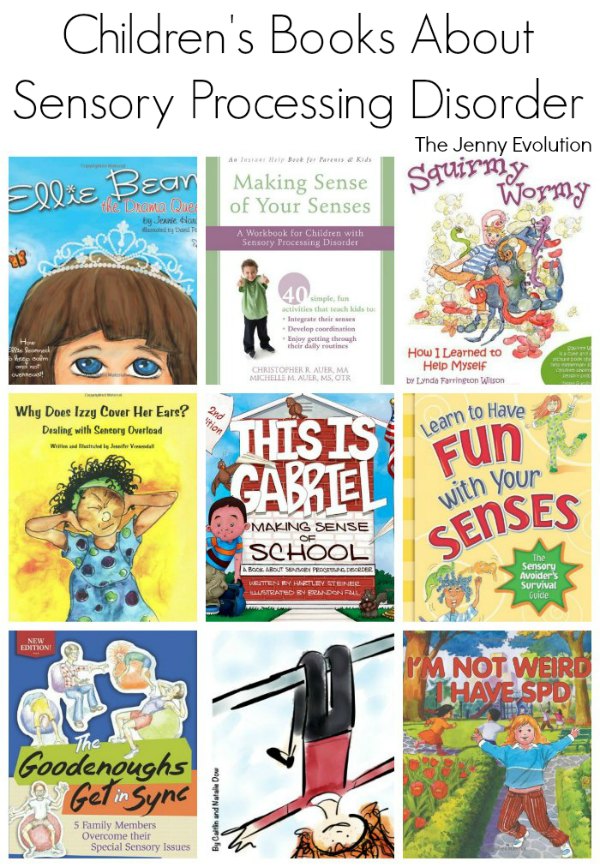Children’s Books on Sensory Processing Disorder
Children’s books on Sensory Processing Disorder (SPD) are a terrific way to educate and get the conversation started.
As parents, we often aren’t quite sure how to talk to our kids (or their siblings) about sensory challenges. You can use these stories to help you!
For more reading ideas, visit our extensive list of childrens books for kids!
You can find these children’s books on Sensory Processing Disorder at your local library or purchase through the affiliate links provided for your convenience.
Sensory Processing Disorder Information
If you’re new to Sensory Processing Disorder or need to understand it better, these books can greatly help you not only understand but support your child with sensory needs.
Be sure to learn more about Sensory Processing Disorder and my parenting tips on how to support your child with sensory challenges.

Children’s Books on Sensory Processing Disorder
When we were first managing SPD, I often wondered how I could talk to my child about his sensory difficulties.
What I found were books on Sensory Processing Disorder were an awesome way to begin the conversation, help him verbalize how he felt and also help him not feel so alone or strange.
PICTURE BOOKS ABOUT SENSORY PROCESSING DISORDER
In this charming, colorful, and easy-to-read book, children will learn about the senses and SPD through their new grown-up friends’ examples, as well as the importance of celebrating what makes them unique.
Thanks to their older, trustworthy sensory guides, children will be reminded that having SPD doesn’t make them less - it makes them wonderful!
The solution-based book that helps children understand Sensory Processing Disorder (SPD) and presents a sensory diet that offers tools and resources a child can use.
This cute children’s book helps explain some bizarre or "dramatic" behavior, and gives easy sensory answers to parents and teachers.
Written by a mom and special education teacher, this story brings home what it is like to grow up with sensory issues, and helps kids understand that they are not alone.
Do you know a kid who HATES to wear socks? Then you’ll LOVE this book!
Parents and kids with sensory challenges will enjoy reading this fun book together. You’ll recognize the struggle and appreciate the surprisingly simple solution.
Teaches children what to do when they are experiencing sensory issues.
Many kids have some form of SPD (Sensory Processing Disorder), but who can help them overcome their daily struggles? Wait . . . they can help themselves!
Meet Izzy, a feisty first grader, whose behavior is often misunderstood as she tries to cope with sensory overload in her new surroundings.
This brightly illustrated book creates an environment that is accepting of students with sensory modulation difficulties, including many on the autism spectrum
Written from the perspective of a typical child, one understands the patience and assistance she willingly offers to her siblings with sensory processing difficulties.
About an exuberant little boy who had difficulty paying attention in class and doing his school work until he is given the tools to accommodate his sensory needs.
Written from Arnie's point of view, the book uses simple language to describe some of the sensory tools and strategies he uses at school and home to help him achieve a more optimal level of alertness and performance.
This book can help children with SPD learn how to explain their disorder to others; help peers understand what children with SPD go through; and also help therapists, teachers and/or counselors learn how to talk about it.
Helping others learn about children with special needs brings understanding to them and help to make them seem less... different.
Appropriate for children, families, and professionals, this wonderful book brings to life the story of Sam, whose over-sensitivity creates chaos and frustration in his life.
Do you know a child who hates the feel of certain items of clothing?
This is a child's perspective on a largely unrecognized condition called tactile defensiveness, a physical condition that causes hypersensitivity to certain touch sensations.
SPD Books for Older Kids
If you have kids in elementary school and older, you may want to consider the following books on Sensory Processing Disorder that can help children have a deeper understand of their sensory challenges and how to address them.
This book represents an introduction to the human senses for kids. It might be your child’s first “read about your own problems” guide.
It explains what can go wrong when the brain inappropriately magnifies the messages sense organs send to it.
This delightfully illustrated chapter book geared for 8-to-12 year olds, tells the charming tale of five family members and their naughty dog (each with a different sensory processing challenge), and how they get in sync after a tough day.
Making Sense of Your Senses is full of activities and skill-building exercises you can do with your child to help him or her balance sensory stimulation and practice self-calming techniques.
Kids can use these techniques anytime they feel overwhelmed or have the urge to seek out intense sensory experiences.
Before long, your child will be better able to tolerate everyday sensations and prevent stimulation overload—essential skills for living a happy, healthy, and comfortable life.

















It is good to see that it is becoming more and more covered. Great selection of books. I have pinned.
It is good to know there are more books coming out… many are from parents who have sensory kids and were disappointed that there weren’t books out there to share with their own children.
This is super helpful! Thanks so much for this resource!
You’re welcome! I’ve read every single one of these books at one time or another with my own sensory boys. They’ve been SO helpful.
What a great list of books! I didn’t realize there were so many books on this topic! I will definitely bookmark this page as a reference for my therapy practice. Thanks!
Wonderful! These books are around… but you have to search. Over the years, I’ve ready every single one to my boys for one reason or another and they’ve all proved helpful.